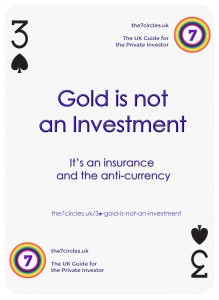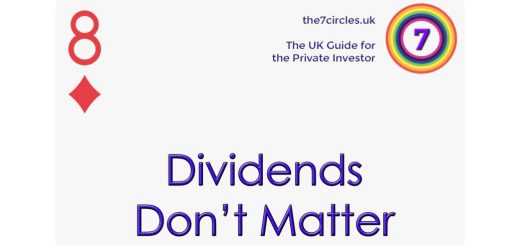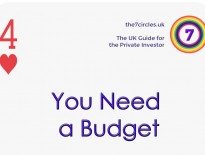3♠ — Gold is not an investment
Gold is not an investment - it's an insurance and the anti-currency.
This post is part of the MoneyDeck series, a pack of 52 playing cards that describe 52 “golden rules” for Private Investors in the UK.
Gold is not an investment – it’s an insurance and the anti-currency.
Gold is unlike most investments. In fact we would argue that it’s not an investment at all.
But many people consider it to be one, so let’s examine its characteristics, and work out what to do with it.
First, a bit of history. Gold appeared on the world scene when the Egyptians began making jewellery from it, in around 3000 BC.
More than two thousand years later, it became de facto money as merchants started to use the jewellery in trade.
Then the Greeks and Romans made coins from it, followed by the European colonial powers, including England (Britain).
Later, coins – and then notes – began to represent a claim on some gold, stored in an official vault, rather than being a piece of the metal itself.
Under the Bretton-Woods agreement at the end of World War II, the dollar was pinned to gold at $35 an ounce.
But in the 1960s the French worried that the Americans had issued more dollars than they had gold to back them. They and other European countries began to exchange their dollar reserves for gold.
The gold standard was abandoned in the 1970s and the price of gold rose dramatically (making US reserves worth more than the dollars in circulation).
Now all money is fiat money, simply declared by a government to be legal tender.
Today gold is largely used for jewellery, though around 20% of the total supply is held on deposit by the world’s central banks and international financial organisations, such as the IMF.
Gold has good points and bad points. Let’s start with the good things. There are three of them.
The first good thing is that returns are poorly correlated with equities (including UK equities, which we are particularly interested in).
- That means that it can be a useful diversifier.
The second good thing is that gold is a good store of value over the long-term. Unfortunately, we really do mean the long-term.
- It’s been a safe store of value for thousands of years, in contrast to all forms of paper money to date.
- But over 10 or 20 years – depending on the price you buy in at – it can be very poor value indeed.
- And just because it beats cash as a long-term store of value doesn’t mean it beats all other assets.
For some, the third good thing is that it offers specific protection against the devaluation of your home currency. ((This is really an extension of the second good thing ))
- When people lose trust in paper money, they often turn to gold as a substitute.
- But let’s not exaggerate the benefit here. We’re talking about semi-Doomsday scenarios, where petrol, beans and bullets will also prove very useful.
- Gold becoming the de facto currency is not something I want to look forward to.
Gold bugs’ basic premise that paper money around the world is going to be worth less and less over time is absolutely correct. They should run from paper money. But where they run to is the mistake. – Warren Buffett
Now on to the bad things. Again there are three of them.
Gold gets dug out of the ground in Africa, or someplace. Then we melt it down, dig another hole, bury it again and pay people to stand around guarding it. It has no utility. Anyone watching from Mars would be scratching their head. – Warren Buffett
The first problem with gold is that is has no uses.
- This is an exaggeration, as it is used in electronics, and would be used a lot more if we hadn’t decided that it was so expensive.
- But you get the picture – it’s a lot less useful that its price would indicate.
- In particular, it does not get used up, so all the gold that has ever been produced is still available to satisfy future demand, should prices rise.
- And demand for gold is largely artificial. We use it in jewellery – mostly in india and China, and often as a visual display of wealth – and we used to use it in coins. ((Though nowadays it’s more than anti-currency than currency – more on that later ))
- Thus it has no intrinsic value – you can’t eat it, power a vehicle with it, or derive anything useful from it.
The second problem is it pays no income.
- Companies make money each year (we hope), and they share some of that money with us as investors.
- Gold not only makes no money, it can cost you money – to store and insure it, in the case of physical gold.
- A side effect of the lack of income is that there is no way to arrive at a “fair value” for gold – it is worth whatever someone will pay for it, and it is difficult to value against other assets other than by historical comparison.
- One approach to valuation is the cost of production – supply and demand should ensure that over the long-term this will be the floor price for the metal.
- Gold bugs believe that the price of gold should make US reserves worth as much as the dollars in circulation, or alternatively the value of US debt held by foreign investors.
If you buy an ounce of gold today and you hold it a hundred years, you can go to it every day and you could coo to it and fondle it and a hundred years from now, you’ll have one ounce of gold and it won’t have done anything for you in between. You buy 100 acres of farm land and it will produce for you every year. You can buy more farmland, and all kinds of things, and you still have 100 acres of farmland at the end of 100 years. – Warren Buffett
The third problem is that is introduces currency risk, of a sort.
- Gold is priced in dollars, so if the dollar moves, so does the gold price.
- More specifically, if the dollar moves against the currency in which you hold most of your wealth – sterling, for most UK private investors – so does the value of your gold.
- Over the long-term, this may well be a wash, but if you anticipate that your currency will appreciate against the dollar, beware that it will also appreciate against gold.
There used to be further problems with gold:
- the expensive options available to own and store it
- at times, an unfavourable tax treatment
- dodgy salespeople and intermediaries in this space
- in the US, the right of the government to confiscate gold from private individuals (exercised in 1933)
Via ETFs, ISAs and SIPPs, these problems have now been eliminated. Gold has not recently been confiscated by a UK government.
So how much gold should you hold? That’s up to you, but we can set some boundaries:
- people with small portfolios (< £100k) probably don’t need any gold at all – cash will be more useful in general
- with larger portfolios, you might want to hold 2% to 5% of your net worth in gold or similar physical precious metals
- serious gold bugs will often advise holding 10% or 15% of your net worth, but I think that’s a serious drag on your portfolio
- between equities and your home, you probably have 75% of your net worth covered
- the remaining 20% has to accommodate cash, bonds and other physical assets (including gold)
- putting 10% to 15% of this in gold looks unbalanced to me
Another rule of thumb is that if you are worried about where the gold price is headed – if you even know what the price of gold is – then you have too much gold.
The next question is how should you invest in gold?
We have four basic options:
- physical gold, including bullion coins (Brittanias and Krugerrands)
- platinum and silver coins are also available
- these track the gold price accurately and are useful if you want to go down the “bury it in the back garden” route
- you can also hold them in bank safety deposits or specialist metal depositories
- investment grade gold bullion is free of stamp duty and VAT
- you could also collect old and rare (numismatic) gold coins – such as sovereigns – though as we have pointed out, the costs to typical private investors are very high
- it’s also possible to hold gold directly in depositories, as bars – this can even work out cheaper than an ETF
- ETFs or unit trusts (OIECs)
- gold (and silver) mining shares – producers and explorers
- these are more speculative, and only recommended for gold bugs
- they don’t track the gold price as closely as you might expect
- speculating on the price via spread bets, CFDs or options
- this is fine for short-term trading, but not really part of a long-term investment strategy
We’ve seen that gold is not an investment:
- it has no uses
- it has no intrinsic or fair value
- it produces no income
- supply is large and primary demand modest
But that it is an insurance:
- over the long-run, it has been a store of value
- returns are not correlated to equities
So why is it the anti-currency?
Gold would really come into its own in a situation where several countries became embroiled in a currency war, or competitive devaluation. This is particularly the case where the dollar is involved.
In that scenario, gold is not only a safe haven, it’s the currency in which other currencies are valued.
It’s the currency that isn’t controlled by a single government or central bank and won’t be competitively devalued – the anti-currency.
So remember – gold is not an investment – it’s an insurance and the anti-currency.
Until next time.

















